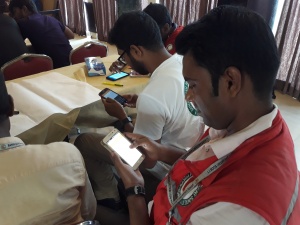New glossary app improves communication between interpreters, aid workers, and Rohingya community in humanitarian response.
DANBURY, CT USA – 20 June 2018. Translators without Borders (TWB), the world’s only non-profit focused on closing language gaps worldwide, announces the launch of the TWB Glossary for Bangladesh. The app gives field workers and interpreters a tool to communicate more effectively with the Rohingya refugees in the Cox’s Bazar region.

The TWB Glossary for Bangladesh provides text and audio translations for five languages — Rohingya, English, Bengali, Chittagonian, and Burmese. It contains 180 key terms relevant to the water, sanitation, and hygiene (WASH) sector. The app can be accessed on a computer, tablet, Android, or iOS device and is available both on- and offline, allowing it to be used in the camps, where internet access is poor.
The glossary, created in partnership with Oxfam, and with support from Unicef, the International Organization for Migration (IOM) and the Department for International Development (DFID), is part of TWB’s ongoing language provision for the Rohingya refugee response. It is the latest in the global series of TWB Glossaries intended to standardize how important concepts and terms are conveyed in the languages of crisis-affected people.
TWB Glossaries, which are built using local language speakers, interpreters, and field workers, provide consistent, accurate, and easily understood words in local languages. They also help interpreters and field staff feel confident in their work and give the field worker greater assurance that they can genuinely communicate with affected individuals.
“The new glossary app for Bangladesh is the result of true collaboration between field workers, interpreters, and the Rohingya community,” explains Aimee Ansari, Executive Director of TWB. “We hope that its launch contributes to a global understanding of the need to incorporate quality, accessible, and consistent translation and interpretation services in humanitarian response.”
To accompany the app, TWB provides training on the terms and the larger context of language differences between Rohingya and the other languages used in the response. Initial training has equipped community mobilization staff from Oxfam, Unicef, the Bangladesh Red Crescent Society, and other agencies that are now better equipped to roll out hygiene and health promotion activities. This is crucial given the monsoon season in the region. The heavy rains increase the risks of flooding, water contamination, diarrhea and mosquito-borne diseases. These heightened risks make effective WASH communication of paramount importance.
TWB plans to expand the app’s term base to include words and phrases relevant to other sectors such as nutrition, shelter, protection, and health.
In addition to the glossary, TWB created fact sheets on the Rohingya language and a WASH language guide that highlights key sociology-linguistic issues. Links in English and Bangla can be found here.
Additional information on TWB Glossaries, as well as a link to TWB’s Glossary for Northeast Nigeria, with focus on protection and property rights, can be found here.
About Translators without Borders
Translators without Borders (TWB) envisions a world where knowledge knows no language barriers. The US-based non-profit provides people access to vital knowledge in their language by connecting humanitarian and development organizations with a community of language professionals, building local language translation capacity and raising awareness of language barriers. Originally founded in 1993 in France (as Traducteurs sans Frontières), TWB translates millions of words of life-saving and life-changing information a year. In 2013, TWB created the first-ever crisis relief translation service, Words of Relief, which has responded to crises every year since.
